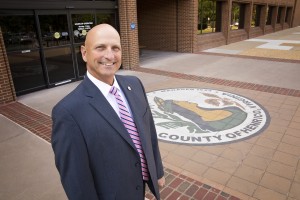 By Jerry Walker, CEM, LEED AP, Chairman of the Board, Resilient Virginia and Henrico County Energy Manager
By Jerry Walker, CEM, LEED AP, Chairman of the Board, Resilient Virginia and Henrico County Energy Manager
Resilient Virginia burst onto the radar screens of leaders from federal, state and local governments, and concerned citizens with their 2016 Resilient Virginia Conference in Richmond, on March 22nd March 23rd. The two-day conference at the Greater Richmond Convention center attracted over 220 attendees, speakers and exhibitors. With a theme of activating communities and businesses for a more resilient future, three major geographic regions were addressed; coastal, rural, and urban. Issues such as weather, coastal flooding, urban-underdevelopment, agricultural demands on dwindling farm space, and man-made threats to our well-being were all addressed.
By way of plenary and break-out sessions over the two day period, Resilient Virginia positioned itself as the go-to source of information and education for matters related to resiliency in the Commonwealth. By all measures this conference was timely, informative and enthusiastically received by all attendees and participants. As the importance of resiliency remains an issue in Virginia, Resilient Virginia will be there to assist in preparing our residents, businesses, and governmental leaders to recover rapidly form any stress related event we may experience.
Resilient Virginia’s roots run deep. Evolving from the Virginia Sustainable Building Network, an organization that helped develop better building standards and education throughout Virginia over an 18 year period, Resilient Virginia brings a team of committed professionals to the forefront of this new and topical threat to our long term survivability in light of man-made and natural stresses.
To address each major topic in each region, Resilient Virginia’s host of speakers included The Honorable Brian J. Moran, Secretary of Public Safety and Homeland Security, Dr. Alan Hecht, the Director for Sustainable Development at the Office of Research and Development, U.S. Environmental Protection Agency, Donald Lumpkins, the Director of the National Integration Center for the Federal Emergency Management Agency, Ms. Harriet Tregoning, Principal Deputy Assistant Secretary in the Office of Community Planning and Development for the US Department of Housing and Urban Development, and a host of speakers from the Commonwealth, state universities, local government and Planning Districts.
With such a cast of speakers addressing resiliency topics, we received comments such as: “superlative speakers”, “really diverse audience that provided an opportunity to network with government and business contacts”, “never have seen a conference like this in Virginia – great work”, and “a brilliant first conference”.
No resilience topic was left un-discussed. Attendees were made aware of activities throughout Virginia and the nation that are focused on making our communities and businesses more capable of rapid recovery from the many potential stresses facing us in the days ahead. The key to the conference was that the revelation that there are solutions, from all levels of government and from the host of the conference, Resilient Virginia.
See you at the next Resilient Virginia Conference!
NOTE: Jerry Walker will be retiring from his Henrico County Energy Manager job this coming May, and we will have to let him go as the Chairman of Resilient Virginia. On behalf of myself and the Resilient Virginia Board of Directors, we heartily thank Jerry for his outstanding support of the mission and activities of our organization.




